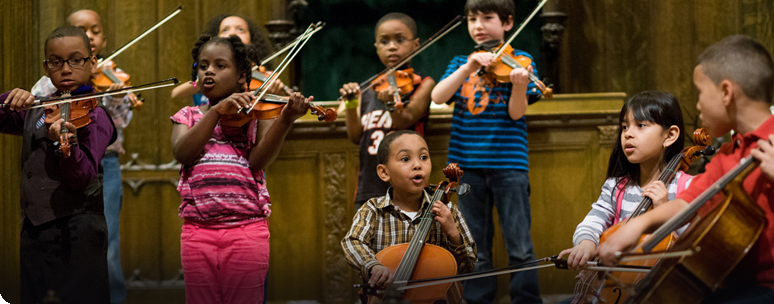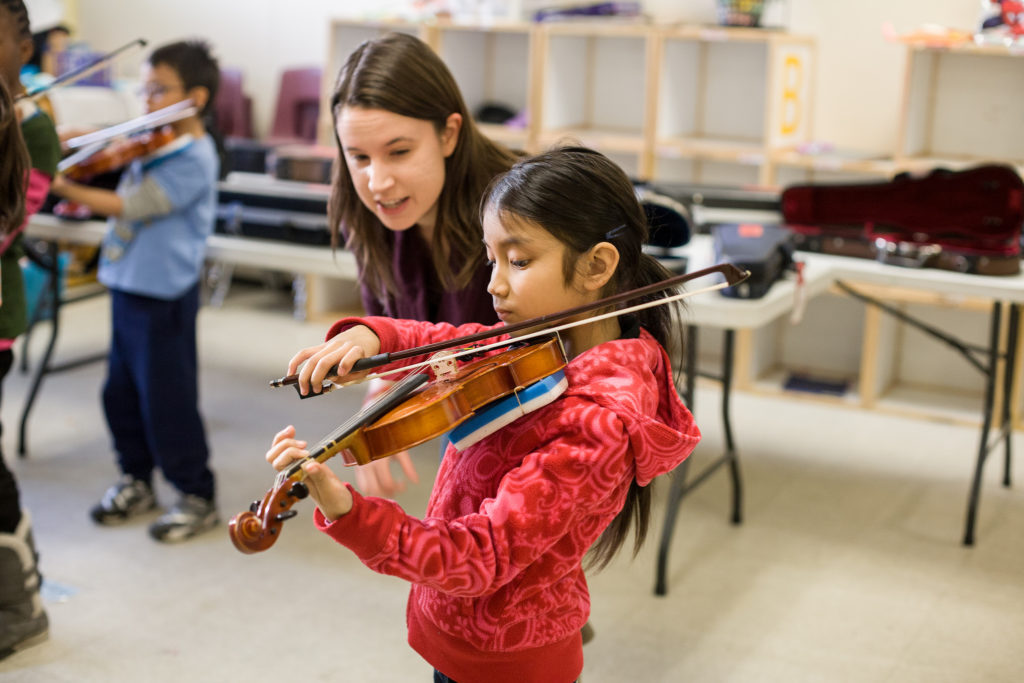At times the practice of teaching feels akin to looking at your pores in a magnifying mirror. It’s an activity to be pursued with great caution and great strength of spirit. It can be extremely unpleasant, may cause hyper-awareness of your flaws, and may result in a tendency to obsess over the tiniest imperfections imperceptible to anyone else. Before you know it you could be drowning in the microsphere. . . or perhaps you’ll be marveling at it. Perhaps you’ll step back and stand in awe of the miraculousness of life. It’s hard to tell on a given day if teaching will send me into a metaphorical pore-flushing frenzy or give me one of these awestruck moments, but that’s the strange beauty of teaching.
When I am in the thick of daily teaching practice, it’s all too easy to lose perspective. I catch my mind obsessing over the tiniest things like curved pinky fingers, a persistent F# when there should be an F natural, a bow that never seems to be rosined, a string that always seems to conveniently come loose before a particular song, the student who habitually plays songs on the wrong string, the jokester who is always vying for my attention, or those pesky friends who just can’t stop talking to each other. If only they’d stop being best friends for a moment maybe we could get something done!!
As a teacher of young children you learn that the tiniest of factors can completely destroy your lesson plan, and there never ever seems to be enough time, energy, or resources to handle all the problems you might see on a given day. Some of these factors are in your control, so you have to be on your guard at all times to make sure you don’t make a terrible mistake you’ll regret for the rest of the day – a mistake like leaving the dry erase markers out in the wild. Or forgetting to unpack your violin before your important demonstration, leading you to have to vamp for some precious seconds, during which time someone does a hilarious dance move and the focus of the entire room is completely lost and the rest of the day goes downhill from there. And why are the cellists suddenly playing tag instead of getting out their instruments?? Ah yes, of course, it is my fault. I forgot to take the cellos out of the closet. I really set them up for that one!
As teachers we learn to anticipate (and obsess over) every possible factor within our control that could go wrong. Occasionally we do a good job with our anticipations, but frustratingly there’s an even longer list of factors that are not in our control at all. I’m still learning what these even are, but I know the list includes things like: a bee could fly into the room, the temperature could be too hot or too cold, there could be a fight among peers before orchestra begins, a birthday party that everyone is super grumpy to be pulled away from, a holiday approaching resulting in a communal sugar overdose, an iPad taken away by a parent, a string breaking, a sick family member, a loss of a friend, or any number of factors ranging from kid-version-of-serious to actually serious. There is no way to predict or control these types of situations, and yet they have real consequences for how the orchestra rehearsal or lesson might go on a given day.
If monitoring, preparing for, and navigating all possible negatives sounds kind of exhausting, it is! Remember – pores in a magnifying mirror. Not an activity I could recommend to anyone.
Oh, but then there’s the magic.
There are the moments when I step back from the mirror and see the whole, and I suddenly realize “This is amazing!” It could be hearing my own words echoed back to me from a student who I didn’t even think was paying attention in the first place. It could be a hug, a smile, an admission “I feel proud of that” or a “remember, you’re the one who taught me how to do that, Ms. Lisa!” or “No, silly, Thomas Tallis lived in the 1500s!” It could be hearing the students who spontaneously improvise together while waiting backstage for a performance or the student who teaches herself a piece by ear without any help from me at all. There are moments when I realize in spite of all the inevitable messiness, the imperfection, and the runny noses, progress is being made. Learning, music-making, and community building are all happening. Transformation is happening! In fact these things have all been happening right before my eyes the whole time, all while I was fretting over the location of the dry erase markers.
These magical moments can happen at any time, but for me they tend to amplify at the end of the school year, when I finally have space and opportunity to look back in time, to see the longer view of the year (or rather 6 years now that I have 6 years of time at CMW to look back on!). I had one of these moments recently when I watched the video of this year’s annual Gala – a video of every CMW student and musician joining together in an orchestra to make music. Mind you, when I was actually performing in the Gala I was too worried about a potential vomiting situation. It took watching the video for me to recognize what an incredible feat that performance was and how it truly represented the the invaluable work that every single person involved with Community MusicWorks is doing year-round (and has been doing for the past 21 years).
The mission of Community MusicWorks is to create cohesive urban community through music education and performance that transforms the lives of children, families, and musicians. A mission of transformation is a lofty one! Truthfully, in my earlier years here I sometimes felt frustrated that this lofty mission didn’t really distill down into simple, practical, manageable steps. There was no exact template for how to do this, no step-by-step guide to transforming lives and building community. No exact recipes, no guarantees, no user manual, no unit of measurement to tell if the process was working. And the practice itself didn’t always feel that magical or transformative! It seems a bit strange that achieving a lofty mission can involve a whole lot of seemingly menial tasks and a fair amount of stumbling around in the dark, and yet the reality that it does involve those things is a deeply comforting truth to me.
When I look at the evidence before my eyes, I’m faced with an undeniable truth – that the CMW community is collectively achieving its mission. I can see it in the ways the young musicians of the Daily Orchestra Program have grown and evolved, both individually and together, but I don’t really need to look that far. I can see it in myself and in the many ways I have grown, evolved, and learned through this work, with the support of this amazing community. In other words, to see a life transformed by CMW I only have to look in the mirror.
–Lisa Barksdale, Resident Musician

